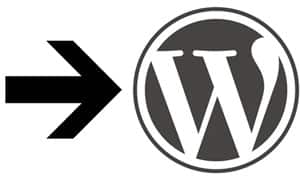Why Migrate to WordPress? Here’s 5 Benefits of Making the Move
by Jason Unger, Founder
Insights / Website Development /

 One of the most popular web development projects we’ve been presented with over the past year or so has been clients asking us to take their old-school, static HTML websites and migrate them to use WordPress as a content management system.
One of the most popular web development projects we’ve been presented with over the past year or so has been clients asking us to take their old-school, static HTML websites and migrate them to use WordPress as a content management system.
(Here’s an in-depth post on how we approach this type of project, from when we did it for our clients at CTS Guides.)
We recently migrated the website for a great partner of ours, Daly Computers, Inc., a leading provider of IT solutions to government and education customers in the Mid-Atlantic. While we did a modest redesign of their homepage, their switch to WordPress was completely under-the-hood, meaning: if you didn’t know they made the switch, there’s no way you could ever tell.
What’s so great about doing these WordPress migrations is that you don’t have to do a total redesign of your site. If you like the look-and-feel of your current site or have budgetary constraints, you can migrate to WordPress without having to start from scratch with a new site.
It’s certainly something appreciated by the clients we’ve worked with on these projects, and it’s only one of the many benefits you get making the switch.
Here’s five more benefits of migrating to WordPress.
Much, Much Easier to Manage and Use
This is, by far, the most popular reason why people migrate to WordPress.
Most of the time, a static HTML site means you need to log in to your server (either through FTP or some other method), download the actual HTML file you want to update, go through the actual code (or open it in a WYSIWYG editor like Dreamweaver) and find what you need to edit, make the changes, then re-upload.
And that’s just for one page. Just wait until you have to edit a link or text that’s on every page of your site … especially if you have hundreds of pages.
I’m always telling folks that if they know how to use Microsoft Word, they can use WordPress. There’s a familiarity there that comforts them. The site becomes much easier to manage and use when it’s in a content management system like WordPress.
Clean Up Consistency in Design
In every migration we’ve done, there’s always a page here or a page there where the design is slightly off from the rest of the site. They’re normally not make or break types of mistakes, but it’s clear that there was either a coding error or something was poorly copy-and-pasted in a particular file.
When we’re building a WordPress template based on a pre-existing design, it gives us the opportunity to clean up those inconsistencies. The templates get used on every page (or group of pages) on the site, so you don’t have to worry about one of the pages having an incorrectly sized logo or a misspelled word in the menu.
A Whole Library of Plugins at Your Disposal
We’ve talked about some of our favorite WordPress plugins before, but imagine for the first time being able to easily add new features to your site. You really could do anything.
When you’ve got a straight HTML site, you have to be resourceful in finding solutions for some of the easiest (and most common) functionality, like forms, search, and more (or code it yourself). It’s not something you worry about when you’ve got a site on WordPress; there’s a plugin for that.
Preparation for a Total Redesign
If you’re not ready to do an entire redesign when you migrate to WordPress, that’s totally fine. The good news is that when you are ready to do that, the process becomes much simpler.
Once you’ve got all of your content into a database and running under WordPress, at that point it’s only a matter of designing and developing a new template to be used. (That in itself can certainly take some time, but once it’s put together, you’re basically talking about the flip of a switch.)
When you’ve got the site running under WordPress, mass changes become much easier to handle. That’s the beauty of having your content in a database and your design dictated by one theme that controls everything.
Improved Search Engine Optimization (SEO)
Out of the box, WordPress does a pretty good job at being optimized for search engines, and with the tools it offers, you can tweak your site and content to be very attractive to Google.
There’s great SEO plugins available (we recommend WordPress SEO by Yoast) and plenty of tutorials written just for WordPress.
You certainly could have had great optimization on a static HTML site (there’s nothing specific to WordPress that it would automatically outrank a static site), but by using WordPress, you’ve got a lot more options, a lot more guidance and a lot less to worry about than doing it all manually.




